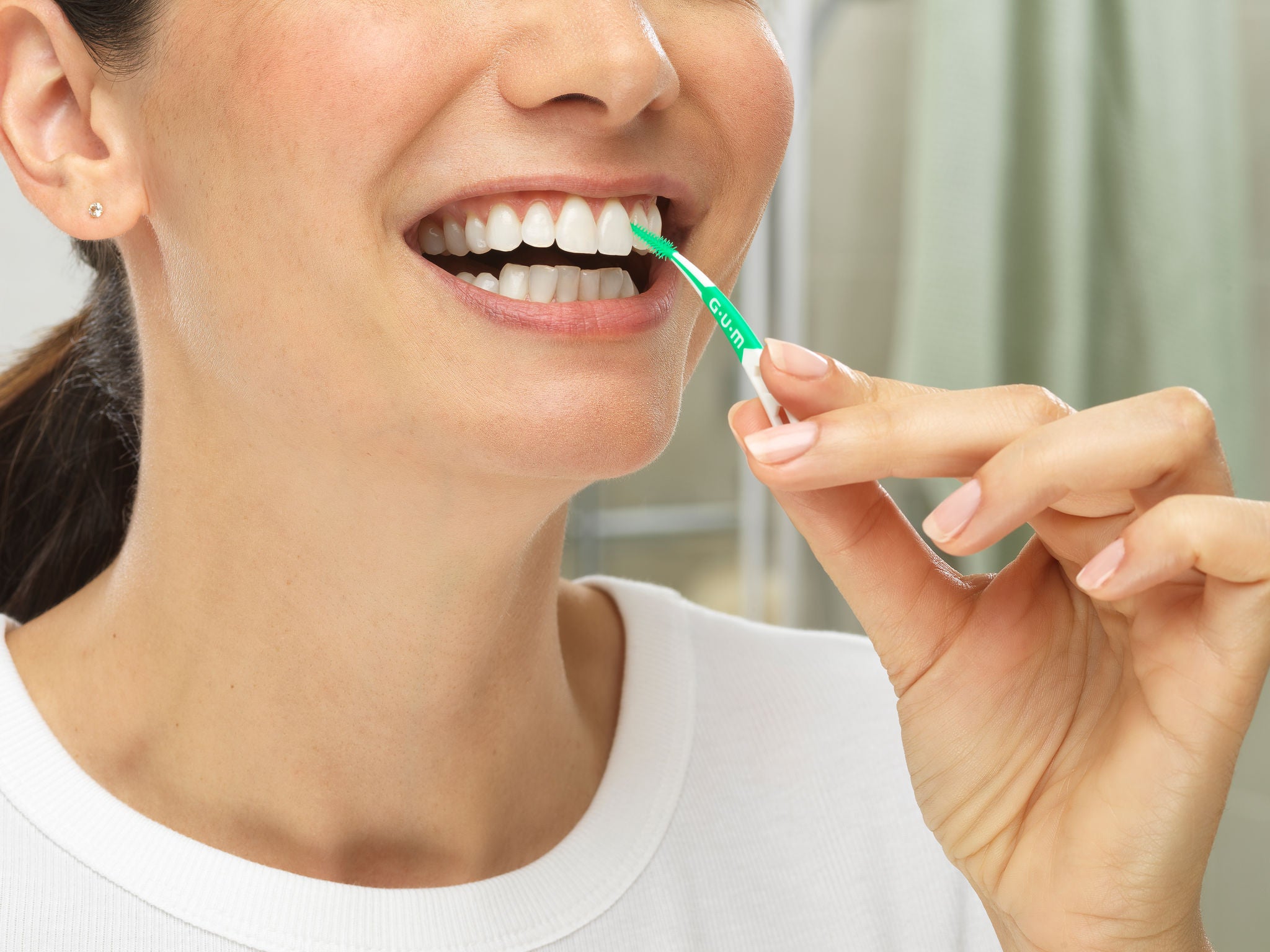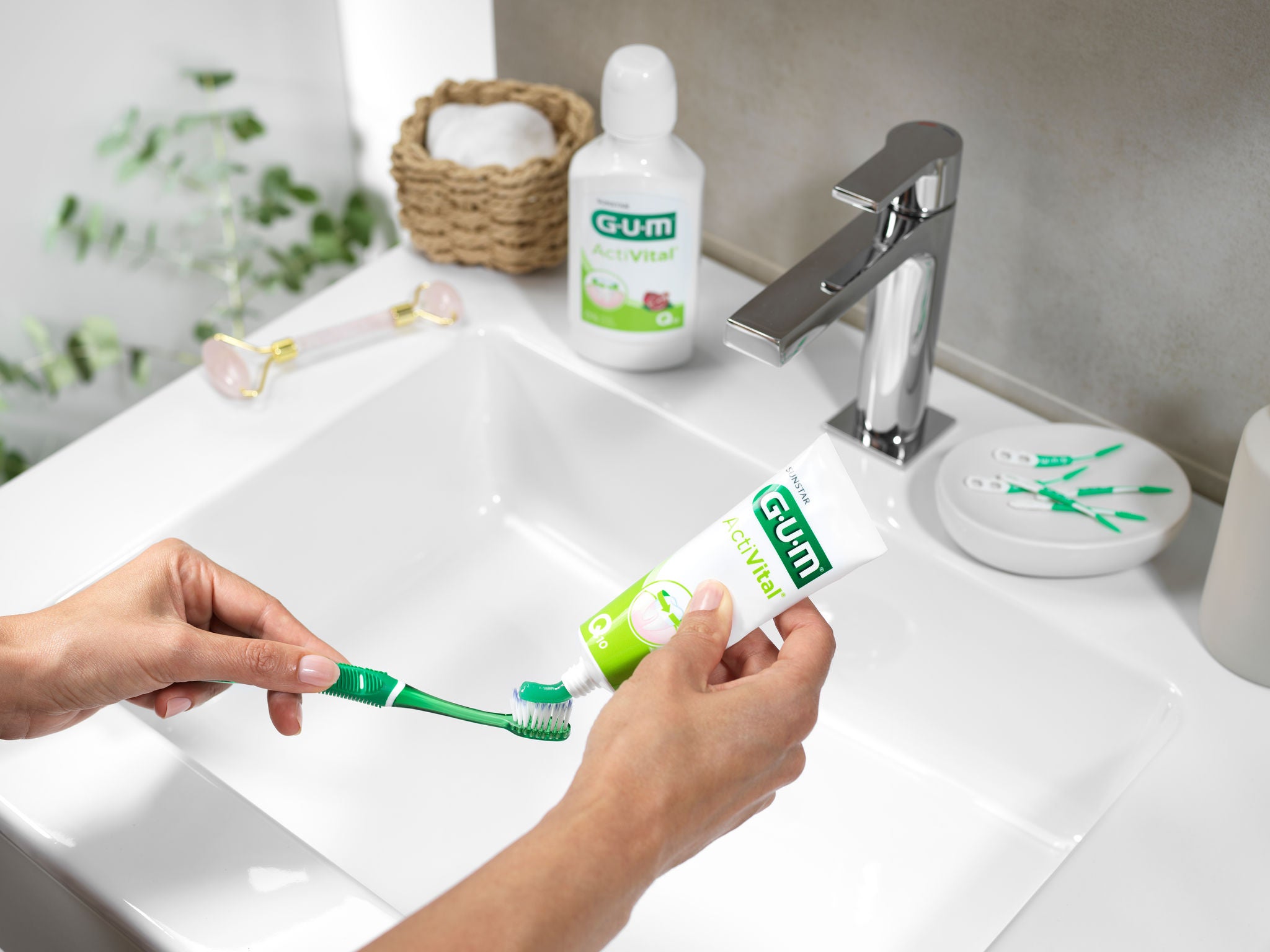
Bedtime Rituals for Healthy Teeth and Gums
While we often associate dental care with our morning routines, performing a full dental care routine before you slip into sleep is equally important. As you wind down for the night, dedicating a few minutes to your teeth and gums will have a lasting positive impact on both your oral and overall health.

To fully understand why following an oral health routine before bed is so important, it helps to understand what happens in your mouth over night – especially if you don’t take the time to brush and clean interdentally before you fall asleep.
What happens in your mouth overnight while you sleep?
While you sleep, several changes occur in your mouth that can significantly impact your oral health.
Reduced saliva flow
Saliva plays a crucial role in maintaining oral health. It helps neutralise acids produced by bacteria, aids in digestion, and provides a natural defence against oral infections. However, during sleep, your saliva production decreases, leaving your mouth less equipped to wash away debris and counteract acid.
Bacterial growth
The warm and undisturbed environment of your mouth during sleep provides an optimal breeding ground for bacterial. This gives bacteria the perfect chance to multiply overnight, leading to an increased risk of bad breath, tooth decay, and gum inflammation.
Bacterial activity
Plaque (a sticky film of bacteria) naturally build up in your mouth between oral care sessions. Every time you eat a meal, you leave behind at least a little food debris on or between your teeth. If you go to sleep without removing this food debris, you’re providing the bacteria in your mouth with a meal it can spend all night working on – and producing acids for hours on end in the process. The more food debris these bacteria can eat overnight, the more acid it will produce and the more damage it will inflict on your teeth and gums.
Plaque and debris accumulation
If you haven't cleaned your teeth before sleep, plaque (a sticky film of bacteria) and food particles can accumulate on your teeth and gums – and even on or under your gum line. Without proper cleaning, these substances remain on your teeth.
The longer plaque stays in your mouth, the more damage it can inflict on your teeth and gums. Every night you don’t remove it, this damage will worsen, until eventually it creates cavities and gum disease.
The longer you allow plaque to remain in your mouth, the harder it will become to remove. Eventually, plaque accumulations will harden into a substance called tartar. Tartar visibly discolours your teeth, and must be removed with professional help. Allowing tartar to develop on your teeth and gums also exacerbates the health problems posed by plaque, increasing your risk for tooth decay and gum disease.
Dry mouth
Breathing through your mouth while sleeping, especially for those who snore or have sleep apnoea, can contribute to dry mouth. Dry mouth exacerbates the already reduced saliva flow, making your oral environment even more conducive to bacterial growth and acid buildup.
Grinding teeth (bruxism)
Some individuals grind their teeth during sleep. This grinding can wear down tooth enamel and potentially lead to other dental issues.
While doctors don’t completely understand what causes bruxism, your likelihood of experiencing it rises if you’re stressed, taking certain medications, or drinking or smoking before bedtime.
Incorporating a healthy oral health routine won’t directly help treat bruxism, but it can help mitigate the damage bruxism may make you naturally more vulnerable to. If you experience chronic bruxism, wear a mouthguard to bed.
How does a bedtime oral care routine help?
A bedtime oral care routine plays a vital role in safeguarding your oral health on multiple fronts. By following these simple steps before you go to sleep, you make sure the bad bacteria in your mouth do not stand a chance, establishing a bedtime routine that contributes to a lifetime of healthy teeth and gums.
Prevents bacterial growth
Bedtime oral care removes the food particles and plaque that naturally build up in your mouth and on your gums during the day. This substantially helps prevent the overnight bacterial growth linked with tooth decay, gum disease, and bad breath.
Reduces acid attack
Nighttime cleaning counters the acid attacks that would otherwise occur. It helps remove excess plaque and bacteria that would generate additional acid overnight, and removes the food debris that bacteria would use as a source of fuel for generating that acid.
Overall, following an oral health routine right before you go to bed will substantially reduce the amount of damage acid in your mouth can inflict overnight, helping to preserve your tooth enamel and keeping your mouth healthy.
Minimises gum problems
The longer you allow bacteria and plaque to grow along your gum line, the more chance bad bacteria will get to irritate and weaken your gums. Over time, this can lead to gum diseases such as gingivitis and the more serious periodontitis.
Regular cleaning removes the buildup of plaque along the gum line, helping reduce your vulnerability to gum irritation and the gum diseases that frequently result from it.
Enhances overall oral health
Consistent bedtime oral care reduces the risk of dental problems, leading to fewer dental appointments and potential long-term cost savings.
Enhances overall general health
Caring for your oral health has been proven to significantly benefit your overall health in several ways.
For example, practising good oral hygiene has been proven to help boost the health of your whole immune system. That means routinely practising a healthy oral cleaning ritual every day can help reduce your risk of developing more serious chronic diseases like diabetes or cancer.
Why should I brush my teeth in the morning if I brushed them at night?
Brushing your teeth in the morning is a key step in maintaining your oral health, even if you brush them at night.
No matter how well you cleaned interdentally and brushed your teeth before bed, some amount of bacteria and plaque will redevelop as you sleep – the naturally warm environment of your mouth and lower salivary flow are simply too conducive to fully prevent it.
By brushing your teeth again in the morning, you can clear away any of the bacteria and plaque that developed during the night. Morning and night time brushing are complementary steps in your daily oral care routine, working together to maintain your oral health.
Steps for a complete bedtime oral care ritual
A typical bedtime oral care routine involves several key steps to ensure the health of your teeth and gums during sleep.
4. (If applicable) Nightguard care:
If you wear a night guard to manage bruxism, clean and rinse it thoroughly before placing it in your mouth. This helps prevent bacteria and debris from accumulating under the guard during the night.
By following this bedtime oral care routine, you're ensuring that your teeth and gums are well taken care of while you sleep.
Remember, consistency is key to maintaining optimal oral health.




